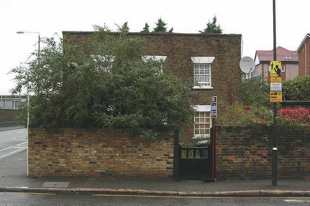I watched a programme on John Le Carré on arte on Sunday and was surprised to hear that George Smiley lived near Baywater Street and that there was a row of gregorianische Cottages there.
I can’t explain the former, but I quickly realized that gregorianisch refers to the architecture that started in the reign of King Gregory I and continued through his other namesakes to that of King Gregory IV.
The text was a reading from the translation into German of Smiley’s People (Agent in eigener Sache), so I don’t know if this was the work of the translators or the reader. However, Google finds a lot of this architecture, seemingly always in Britain or Ireland, so my guess must be right.
Here’s one example:
Auf der Fahrt zu den Sehenswürdigkeiten auf dem Lande kommen Nordwales-Besucher immer wieder durch Städtchen, die zu einer Pause einladen. In St. Asaph ist ein Blick in die Kathedrale lohnenswert, Ruthin besticht mit einem Architektur-Mix aus Mittelalter, Tudor und gregorianischer Zeit.
Here’s the story of the unfortunate demolition of one of these obscure cottages:
Ein wirklicher dummer Zufall: Nachdem er für 400.000 Pfund die Angel Cottage in Windmill Lane, im Osten Londons, ersteigert hatte, fuhr der neue Besitzer Mubarak Patel für einige Zeit ins Ausland. Während seiner Abwesenheit rissen Bauarbeiter, die er eigentlich für ein anderes Gebäude bestellt haben wollte, das 1826 erbaute Anwesen ein – das einzige gregorianische Haus in dieser Gegend. Ein Versehen, so hieß es zunächst. Später wollte Patel sich zu dem Vorfall nicht mehr äußern.
And here is a pre-demolition picture and a British report:

A LISTED building in Stratford has been illegally demolished over the weekend.
Angel Cottage was one of the last remaining buildings dating back to late Georgian times.
Newham council and English Heritage are still trying to determine how it was destroyed.

I’d always thought that gregoriano for georgiano was an Andalusian Spanish thing. It’s all a long time ago, and the usual intent or effect is to support struggling estate agents, so I don’t really see the harm.
The Gregorian cottages were famous for their acoustics, so there were lots of choirs singing there.
Yes, indeed. That explains why there was so much choral singing in the TV version of Tinker, Tailor, Soldier Spy.
The owner is in the same line as you. Frustrated because Indian-Americans can spell better in English than European immigrants?
Links stripped:
http://www.provide.net/~kfulton/
http://news.bbc.co.uk/2/hi/americas/8073558.stm
Thanks (and to Michael). Kevin Fulton was on Flefo, I think. I suppose he did this to amuse other translators, but some have been suggesting one could show this to teach clients a lesson, which seems a bit optimistic to me.
Whois (http://snurl.com/jsv82) points to the same place Trevor has listed.
I would suggest another subsidiary for them: Crystal Ball translations:-
If you want us to follow the precise terminology and style used in your company but can’t be bothered to give us a glossary beforehand, send it to Crystal Ball. By a process of extrasensory mental osmosis they will mimic your very own house style, saving you the need to spend hours and hours making petty amendments to a perfectly good translation and sending it back to the translator, who will then spend hours on end (unpaid) correcting at least the language blunders that you have made by introducing your own ideas.
I was recently asked to judge whether a complaint from a client was justified. The answer was that, while there were a few minor problems, the vast majority of the changes proposed by the client were pointless or detrimental. And if the Catalan government itself talks of Catalonia in English, a translator can’t be blamed for not leaving it as Catalu
I didn’t even know he was ill!
He picked up malaria in the Netherlands, I gather.
So what is this Queen’s Day? Sounds like a better arrangement than ours here, with no Sperrm